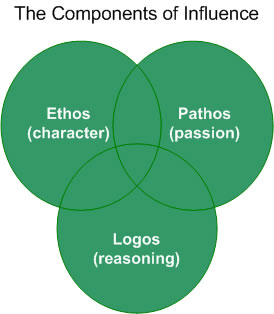| SOFTWARE IN PRACTICE |
|
Influence(Alias: persuasion)
The fool tells me his reasons. The wise man persuades me with my own. To influence is to induce beliefs, attitudes, values and behaviours in other people by influencing their thoughts and actions through specific strategies. Influence is the science of understanding how people process information and the skill of presenting it in a way that causes it to be received, valued internalized and acted upon. Everyone Has Their Own TruthNeuroscientists tell us that there is no such thing as objective reality. To prevent our brains from being swamped by the torrent of information that flows over us every day we have become masters of filtering. We absorb what our minds deem to be important and ignore the rest. This filtering process is controlled by emotions expressed as our values, beliefs and attitudes. We believe something to be true only if it is consistent with our strongly held beliefs. Reality therefore is only what we perceive it to be. Facts, in isolation, have no value. It is our personal belief that a fact represents the truth that makes it significant. In the process of personal development we come upon a new fact, determine if it is worthy of passing through our filter, reflect on its value and either incorporate or exclude it from our perception of truth. Influence is the process of taking your perception of the truth and passing it on to others Aristotle's Components of InfluenceOne of the most useful and widely applied tutorials on influence has been in the public domain for over 2000 years. The Greek philosopher Aristotle published the classic On Rhetoric around 350 BC. Aristotle suggested that a speaker's influence over his audience flows from the use of three essential devices: ethos (character), pathos (passion) and logos (reasoning).
Pathos is the passion you have for your subject and the empathy you have for others. Before you can persuade others to follow a course of action you need to transparently and passionately believe in it yourself. If you aren't personally convinced, your unspoken emotional queues will be picked up from your body language by your audience's social radar. In modern English "pathos" means to demonstrate feeling and sympathy for suffering. In the context of any human relationship this extends not only to passion for the knowledge domain but also to displaying empathy for your audience, viewing them as a human beings with emotions, hopes, fears and ambitions. For example, you exhibit pathos by enquiring how people feel about challenging experiences. Properly displayed, pathos recognizes two beliefs that are strongly held by all of humanity:
Once you have negotiated these critical first steps of "belief" your audience will become much more receptive to your logical argument. The deepest principle in human nature is the craving to be appreciated. - Dale Carnegie Logos is the reasoning you use to build an objective, logical, rational, persuasive, unambiguous, complete and defensible argument. If pathos is the work of the heart, logos is the work of the head, it is the language used to express the goals, techniques, facts and outcomes of human endeavours. Our society reveres logic. People are influenced by logical arguments based on objectivity and the facts. (See the sidebar Framing/Pitching a Logical Argument for further information.) How to Sell Your IdeasThe essence of Aristotle's argument is that ethos, pathos and logos must all be present to establish influence. For example, without first establishing ethos and pathos the most logical of arguments can be rejected. Feelings compel you to take action; logic is often applied after the fact to justify your actions. Exposed to all three elements of influence a person's thought processes might flow like this:
In this way the "logical solution" (logos) has been wrapped around emotions (ethos and pathos) to create a powerful personal belief that motivates action.
|

Framing a Logical Argument
Pitching a Logical Argument
|
|||||||||||||||||||||||||||||||||||||

